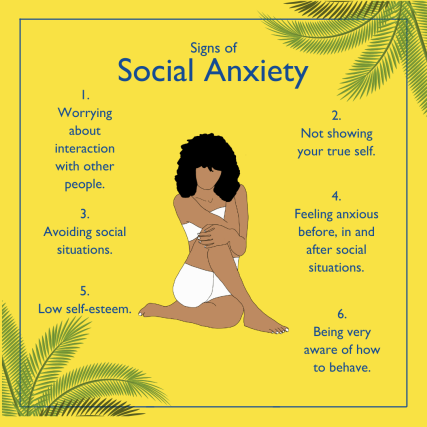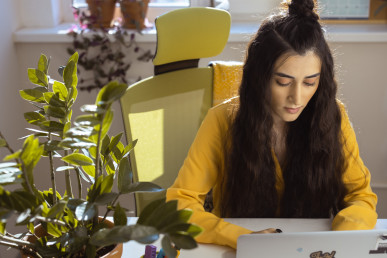Your helpful guide to understanding social anxiety
What is Social Anxiety?
It can be common to feel nervous from time to time when you are around people, for example, meeting new people for the first time, attending an event alone or giving a presentation. Social anxiety can be a feeling of nervousness or being overwhelmed in social situations particularly when you need to interact with other people and can often mean worrying about socialising before, during and after.
Frequently feeling overwhelmed in social situations can be stressful. It may stop someone from saying yes to hanging out with friends, attending works drinks or functions that they would like to go to but find themselves unable to tackle the worry and go.
Now with the easing of COVID restrictions, many people may worry about socialising in large groups again, returning to the office or wonder how they will manage to integrate back to daily life. The UK charity ‘Mind’ conducted two surveys with adults (aged 25+) and one with young people (aged 13-24) between 25 March and 10 May 2021. They found that “one in four (26%) adults and over one in six (18%) young people experienced mental distress for the first time during the pandemic[1].”

When does it tend to happen?
How social anxiety manifests itself will differ from person to person, but some examples include, feeling anxious before a social event that you will somehow embarrass yourself, worrying about what people thought of you, or going over the conversations you had repeatedly after the event. The social event could be anything from a phone call to lunch with work colleagues, or a party with friends.
There is a complex discussion around the effects of social media on social anxiety. On the one hand, platforms such as Facebook and Instagram may help by offering an easy way of communicating with others that is not face to face. This can be helpful, as worries around embarrassment in front of people are less relevant, and it may take the pressure off. When communicating on social media, the other person cannot see if you are nervous in any way. The communication takes place in the safety and comfort of your own home, and with the screen as a buffer, people may feel more inclined to share their experience with others and gain a network of support.
However, social media might do more harm than good. For someone with social anxiety, a fundamental concern is that people will judge and scrutinise you. It is common knowledge that social media can lead others to compare their lives to those they see on people’s profiles, rather than focusing on their own life. Therefore, the worries around judgement are exacerbated as the user keeps track of how many likes their post receives and scrolls through pictures of other people socialising and seemingly having more fun than them. In addition, the more someone hides behind a screen to conduct socialising, the less likely they may be to address social situations or venture out into the real world to meet with people face to face.

What Causes Social Anxiety?
There is not one cause or one answer to this question. It ultimately comes down to nature vs. nurture. There has been links to family history giving someone a predisposition however, this could be less biological and more from learned behaviours growing up with a parent or caregiver who worries about social situations.
Alternatively, it may develop from experiences when someone was younger, perhaps an embarrassing moment in public or an unkind comment.
The causes of social anxiety can also be linked to self-esteem. This is based upon how someone values themselves as an individual. If you have low self-esteem, you might believe you are not good enough and focus on any mistakes or negative aspects or yourself. People with low self-esteem may then avoid social situations, living under the assumption that people won’t like them because they do not have a positive opinion of themselves.
What does it feel like compared to what others see?
Aside from behaviours around social anxiety, such as avoidance, which can be observed by other people, the way it feels to experience it often goes unnoticed. Many of the symptoms happen under the surface, such as worrying or feeling self-conscious. Unfortunately, this can make it more difficult to spot someone struggling and contribute to their feelings of isolation. They may feel like they are the only ones who feel this way about social situations, despite how incredibly common it is.
What can I do to manage social anxiety?
Fortunately, if you struggle in social situations, there are some things you can do to help yourself:
- Relaxation techniques such as deep breathing or body scans that can help calm you and focus your attention inwards, rather than what is happening around you.
- Try to concentrate on what people are saying to you, rather than assuming how they think about you.
- Be kind and patient with yourself as you navigate your thoughts and feelings. Writing them down in a diary might help you understand your social worries and how you may be able to tackle them.
- Challenge any negative thoughts you have about yourself, e.g if someone yawns in your company, rather than assuming they are bored, perhaps they have just had a busy week at work?
- Stretching out your muscles may help relieve tension and stress, leading to overall feelings of being relaxed.
- Start slowly to ease yourself into socialising e.g arrange to meet a small number of friends in a quiet place such as your local park or café, rather than jumping into a large party or nightclub.
- Use mindfulness techniques to calm you down e.g smell your favourite perfume or look at a photograph that makes you happy.

